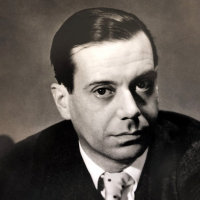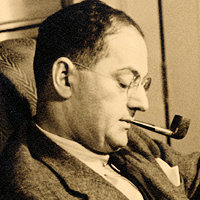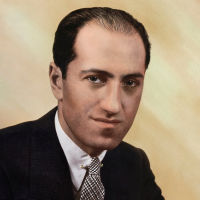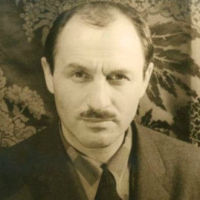4. Anti-Depressants.
How did Broadway handle the Great Depression? For the most part, it simply ignored it. The Ziegfeld Follies,
epitome of extravagant frivolity, continued into the Thirties. Cole Porter's shipboard farce Anything Goes
set sail in 1934. The same deacade also saw the premiere of George and Ira Gershwin's Washington spoof Of Thee
I Sing. Audiences needed comedy, and comedy was the name of the game.
Yet events in the outside world still managed to sneak in. For all its absurdity, Of Thee I Sing skewered
Washington incompetence in ways that strike a chord even today. The original book by PG Wodehouse and Guy Bolton for
Anything Goes culminated in a comic shipwreck—but when a real liner sank in the Atlantic, the producers quickly
hired two other writers to come up with a new one. The ability to take a group of musical numbers are shuffle them to
suit changing circumstance is typical of Broadway in those years, as we shall see in the second hour when we look at
the major numbers in the first act of Anything Goes half of which were written for other shows.
There is one Broadway show of the period that tackles the Depression head-on: Marc Blitzstein's left-wing tribute to
the labor movement, The Cradle Will Rock. Actually not a Broadway show; on the day of the premiere,
federal agents shuttered the Manhattan theater where it was scheduled to perform, so producers John Houseman and Orson
Welles led the audience in a march up to Harlem, where the composer played the piano onstage while members of the
cast sang their numbers from their places in the auditorium. You can't get more political than that! rb.
The script, videos, and images will be posted immediately after class.
The Ziegfeld, Gershwin, and Blitzstein clips are all available on YouTube at the links below; the clips of the Gershwin and the Tim Robbins movie both link to the complete show. I have also added a couple more documentary items on the Blitzstein. For Anything Goes, we are a bit more hit and miss. I give links to buy or rent the complete video, and there is also a show-reel of short excerpts. YouTube gives us a couple of the scenes from the production we saw. Other than those, I have suggested rehearsal clips or similar productions elsewhere. I also threw in Reno's big Act II number from the same production. Clips not played in class are *asterisked*.
Note that Googling "Anything Goes" will give you numerous versions of most of the numbers we heard. Some are covers by solo singers who treat the pieces in their own style. A few are stage productions, often with a different aesthetic and sometimes with a different storyline. The 1956 movie is to all intents and purposes a different work. So watch and enjoy by all means, but know what it is you're watching! rb.
| ZIEGFELD FOLLIES |
| |
Rehearsal Footage |
|
* Newsreel from 1932
|
| |
Film, 1945 |
|
* Bring on the beautiful girls
(Fred Astaire)
|
| |
| OF THEE I SING |
| |
CBS television, 1972 |
|
* Madison Square Garden proposal
(Carroll O’Connor, Cloris Leachman )
* "Jilted"
(Michele Lee)
|
| |
| THE CRADLE WILL ROCK |
| |
The Cradle Will Rock |
|
* "Nickel under the foot"
(Blitzstein sings, audio only)
* "Nickel under the foot"
(Patti LuPone, no titles)
* John Houseman
(video about the premiere)
* Scott Miller
(complete book chapter)
* Tim Robbins film
(cued to premiere; Spanish titles)
|
| |
| ANYTHING GOES |
| |
London production, 2021 |
|
* Buy DVD on Amazon
*
Rent through Amazon Prime
* Various selections
|
| |
I get a kick out of you |
|
* Sutton Foster
|
| |
You're the top |
|
* Sutton Foster, Samuel Edwards
|
| |
Friendship |
|
* Rehearsal footage, 2011
(Sutton Foster with Joel Grey)
|
| |
It's De-Lovely |
|
* Phoenix Theatre
(somewhat similar production)
|
| |
Title Song in Act I finale |
|
* Short excerpt from London show
* Rehearsal footage, 2011
(Sutton Foster)
|
| |
Blow, Gabriel, Blow |
|
* Reno's Act II song
(Sutton Foster, from London production)
|
| |
|
|
|
|
|
| IMAGES |
The thumbnails below cover the slides shown in class, though
there may be a few small discrepancies. Click the thumbnail to see a larger image.
Click on the right
or left of the larger picture to go forward or back, or outside it to close. |
 | |
 | |
 | |
 | |
 | |
 | |
 | |
 | |
 | |
 | |
 | |
 | |
Here are brief bios of the artists, composers, and writers considered in the class, listed in order of birth.
 |
Florenz Ziegfeld II, 1887–1932. American impresario.
After working for his father, who ran a night club in Chicago, the younger Ziegfeld made his way to New York in 1898, where he produced numerous shows, including Show Boat towards the end of his career in 1927. He is most famous for The Ziegfeld Follies, annual extravaganzas that ran from 1907 to 1931, and whose purpose in Ziegfeld's words was to "glorify the American Girl."
|
 |
Cole Porter, 1891–1964. American songwriter.
Unlike many Broadway composers, Porter wrote not only the music but the lyrics for his songs, and these are notable for their wit, clever rhyming, and encyclopedic range of reference. In addition to numerous standalone songs that became standards, he also wrote musicals such as Ahything Goes (1934), Kiss Me, Kate (1948), and Can-Can (1953).
|
 |
Ira Gershwin, 1896–1983. American lyricist.
Ira (Israel) Gershwin is remembered as the lyricist of most of the shows and independent songs of his younger brother George, but he also wrote for Jerome Kern, Kurt Weill, and several other composers. His numbers like as "I Got Rhythm", "Embraceable You", and "Someone to Watch Over Me" have become standards, and he also contributed some of the wittiest lyrics to his bother's opera Porgy and Bess.
|
 |
George Gershwin, 1898–1937. American composer.
Born Jacob Gershwine in New York to Jewish emigrants from Eastern Europe, he studied piano and composition, but soon found his vocation as a songwriter, mostly with his elder brother Ira (born 1896). Most of his songs have become crossover standards, as have his orchestral works Rhapsody in Blue (1924) and An American in Paris (1928). Most of his stage works are primarily containers for his songs, but his 1935 opera Porgy and Bess is an exception, a closely-developed study of African-American life.
|
 |
Marc Blitzstein, 1905–64. American composer.
Although he studied with Schoenberg, Blitzstein's mature work is diatonic with injections of popular music and jazz, placing him somewhere between Kurt Weill and Leonard Bernstein. His opera The Cradle Will Rock (1937) is testament to his Socialist leanings; his Regina (1947), based on The Little Foxes by Lillian Hellman, is still occasionally produced.
|
 |
Kathleen Marshall, 1962– . American director and choreographer.
A Wisconsin-born alumna of Smith College, Marshall began her Broadway career as assistant to her brother Rob, working with him on half-a-dozen musicals before she struck out on her own. Working both as director and choreographer, she has won awards for both the 2006 revival of The Pajama Game and the 2011 production of Anything Goes, which later had similar success in London.
|


















